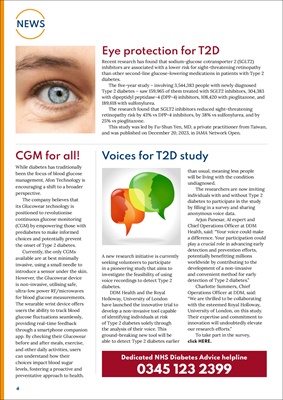
4
NEWS
Dedicated NHS Diabetes Advice helpline
0345 123 2399
Eye protection for T2D
Recent research has found that sodium-glucose cotransporter 2 (SGLT2)
inhibitors are associated with a lower risk for sight-threatening retinopathy
than other second-line glucose-lowering medications in patients with Type 2
diabetes.
The five-year study - involving 3,544,383 people with newly diagnosed
Type 2 diabetes - saw 159,965 of them treated with SGLT2 inhibitors, 304,383
with dipeptidyl peptidase-4 (DPP-4) inhibitors, 108,420 with pioglitazone, and
189,618 with sulfonylurea.
The research found that SGLT2 inhibitors reduced sight-threatening
retinopathy risk by 43% vs DPP-4 inhibitors, by 38% vs sulfonylurea, and by
25% vs pioglitazone.
This study was led by Fu-Shun Yen, MD, a private practitioner from Taiwan,
and was published on December 20, 2023, in JAMA Network Open.
CGM for all!
While diabetes has traditionally
been the focus of blood glucose
management, Afon Technology is
encouraging a shift to a broader
perspective.
The company believes that
its Glucowear technology is
positioned to revolutionise
continuous glucose monitoring
(CGM) by empowering those with
prediabetes to make informed
choices and potentially prevent
the onset of Type 2 diabetes.
Currently, the only CGMs
available are at best minimally
invasive, using a small needle to
introduce a sensor under the skin.
However, the Glucowear device
is non-invasive, utilising safe,
ultra-low power RF/microwaves
for blood glucose measurements.
The wearable wrist device offers
users the ability to track blood
glucose fluctuations seamlessly,
providing real-time feedback
through a smartphone companion
app. By checking their Glucowear
before and after meals, exercise,
and other daily activities, users
can understand how their
choices impact blood sugar
levels, fostering a proactive and
preventative approach to health.
Voices for T2D study
A new research initiative is currently
seeking volunteers to participate
in a pioneering study that aims to
investigate the feasibility of using
voice recordings to detect Type 2
diabetes.
DDM Health and the Royal
Holloway, University of London
have launched the innovative trial to
develop a non-invasive tool capable
of identifying individuals at risk
of Type 2 diabetes solely through
the analysis of their voice. This
ground-breaking new tool will be
able to detect Type 2 diabetes earlier
than usual, meaning less people
will be living with the condition
undiagnosed.
The researchers are now inviting
individuals with and without Type 2
diabetes to participate in the study
by filling in a survey and sharing
anonymous voice data.
Arjun Panesar, AI expert and
Chief Operations Officer at DDM
Health, said: "Your voice could make
a difference. Your participation could
play a crucial role in advancing early
detection and prevention efforts,
potentially benefitting millions
worldwide by contributing to the
development of a non-invasive
and convenient method for early
detection of Type 2 diabetes."
Charlotte Summers, Chief
Operations Officer at DDM, said:
"We are thrilled to be collaborating
with the esteemed Royal Holloway,
University of London, on this study.
Their expertise and commitment to
innovation will undoubtedly elevate
our research efforts."
To take part in the survey,
click HERE.